
Scrutiny on “Travel Industry Bill”
Scrutiny on “Travel Industry Bill”
-
Legislative Background of “Travel Industry Bill”
Since the launch of Individual Visit Scheme in 2003, the inbound tourism industry has flourished rapidly. Although most of our members in the tourism industry have operated their business properly, there has been quite a few incidents related to forced shopping. After being widely reported by the media, the reputation of Hong Kong's tourism industry has been damaged. In view of the situation, the Government decided to set up the Travel Industry Authority (TIA) in 2011.
In early 2017, the “Travel Industry Bill” (the Bill) was formally submitted to the Legislative Council (LegCo). TIA, being an independent statutory body, was delegated to provide comprehensive regulation of travel agents, replacing the current dual-track regulatory framework monitored by the Travel Agents Registry (TAR) and Travel Industry Council of Hong Kong (TIC).
During the drafting stage of the Bill, I have repeatedly suggested to the Government on not to take a “one size fits all” approach of charging a guarantee money of $500,000 from all travel agents. With my suggestion considered, the Bill was adjusted at the time of submission. The revised rule of charging $500,000 guarantee money only from newly-established travel agents could help raise the threshold for setting up travel agents, as well as guarantee that the operation of existing travel agents would not be affected.
- Organized forums for fellow members and attended public hearings, from which to express views to the Government
As the Bill is to abolish the existing Travel Agents Ordinance, in the future, TIA will take up all responsibilities of issuing licenses for travel agents, tourist guides, and tour escorts licenses. Restrictions will be imposed on the licenses, and violations of the license conditions will be considered as criminal offence. Meanwhile, there are special regulatory measures for forced shopping, zero- or negative-fee tours, and online travel agents. The new regulatory framework will have significant impacts on the business practices of existing travel agents and daily work routines of frontline staff. After submission of the Bill, my office organized a number of forums and invited representatives of the industry to attend the LegCo Public Hearings, in order to express their views on the Bill to the Government.
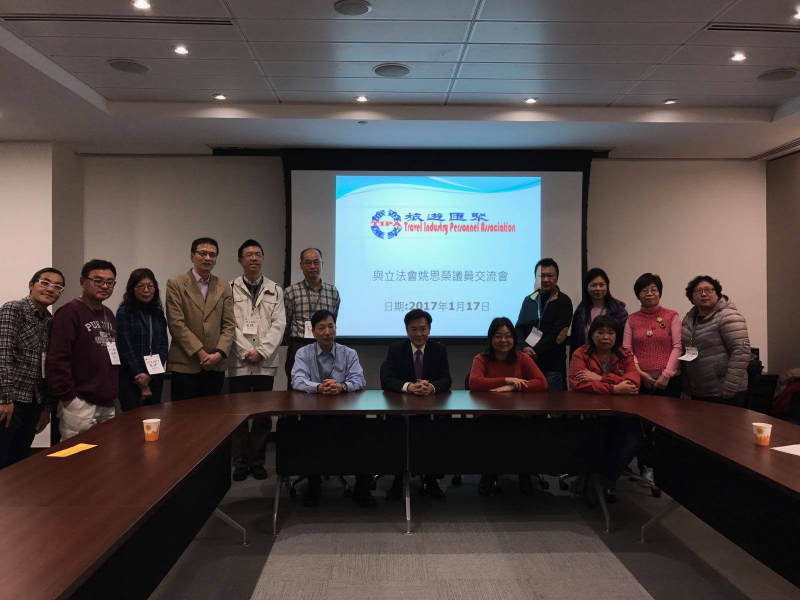
On 24 February, 2017, members of the industry were invited to attend the “Travel Industry Bill” forum to exchange their views on the Bill.
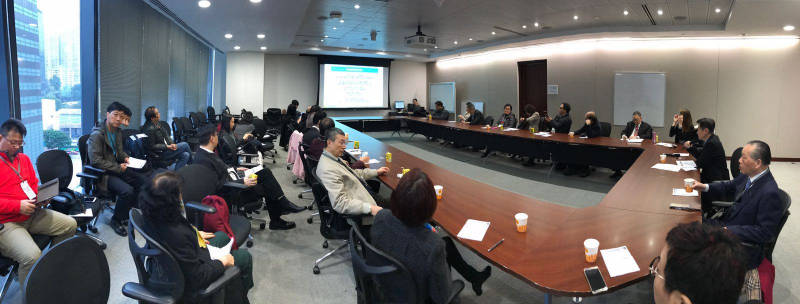
On 17 January, 2017, I met with members of the Travel Industry Personnel Association and introduced the “Travel Industry Bill”
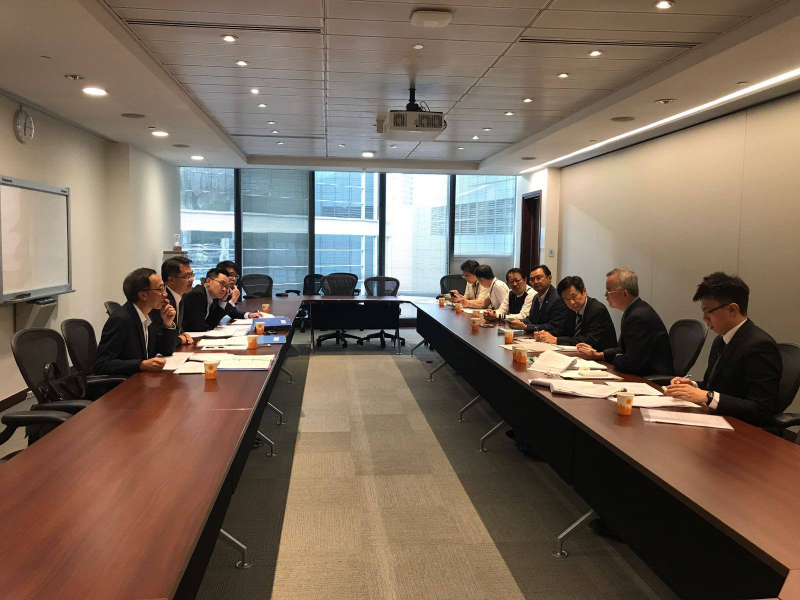
In response to the requests of our members operating Mainland inbound tourism business, I invited representatives of the Tourism Commission to organize forums with the Hong Kong Inbound Tour Operators Association and the Hong Kong Tourism Association (HKTA) on 1 and 26 June, 2017. During the forums, members exchanged their views on the definition for “Mainland inbound tours business”, requirements of details in the regulation, and criminal liabilities for hiring unlicensed tour escorts and tour guides. By addressing the concerns expressed by members of the industry, Mr. Aaron LIU, Deputy Commissioner for Tourism, explained in details the legislative intent of the relevant provisions, to dispel the industry members’ doubts.
On 9 May, 2017, representatives of the industry participated in the public hearing of Bills Committee for the Bill and expressed their views to the Committee.
- Key concerns for the consideration of the Bills Committee
As Chairman of the Bills Committee for the Bill, I have been actively advising the Government in the course of scrutiny to clarify the legislative intent and refine the relevant provisions. Specific concerns are as follow:
1. Owing to the self-financing mechanism, will TIA introduce large increase in the licence fees to the industry in order to maintain its own financial sustainability?
The Government will allocate a seed fund to help operate the TIA, and promised members of the industry that there will not be an increase of levy and license fees in the next five years.
On 10 April, 2017, I expressed concerns to the Bills Committee on whether the TIA would suddenly impose significant increase of fees and create unbearable burdens to the industry after the 5-year guarantee period.
On June 12, 2017, I wrote to the Tourism Commission regarding their financial arrangements described in the Bill, and requested the Commission to provide the following information:
1. The income and expenditure of the TAR and the TIC in the past five years
2. Budget of the TIA in the next five years
3. Arrangements for license fee concession
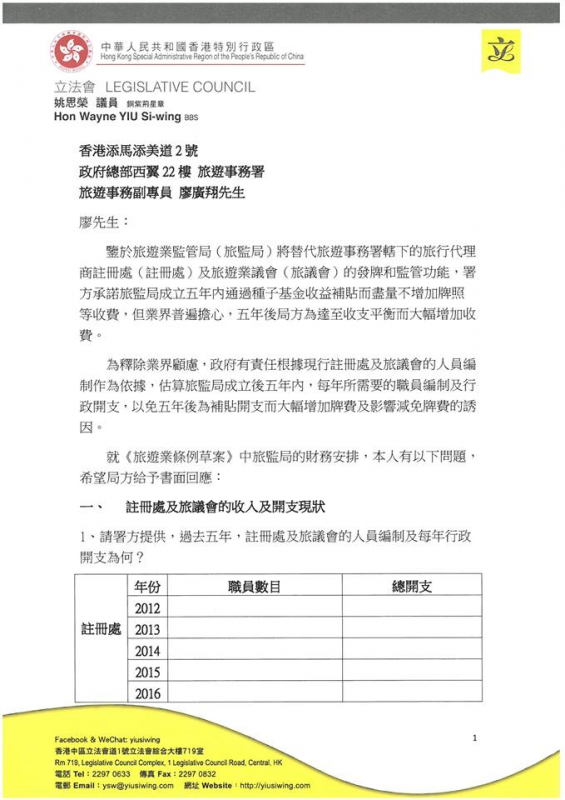
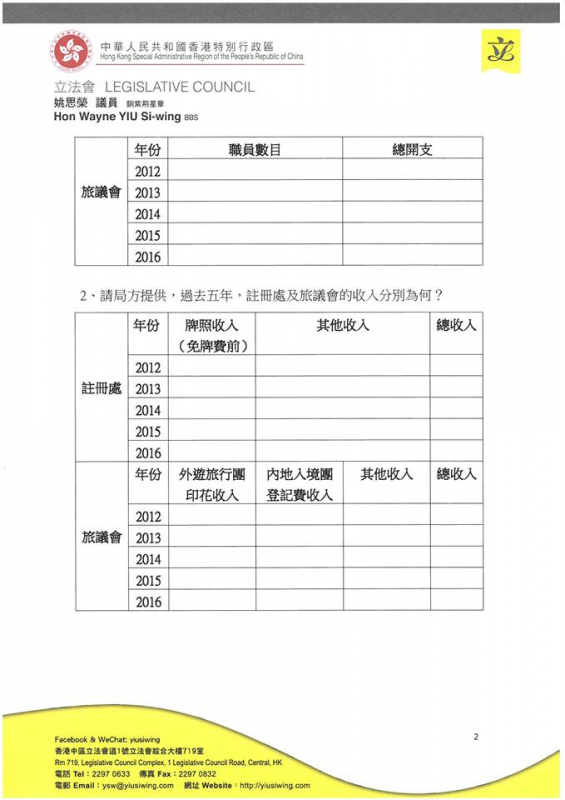
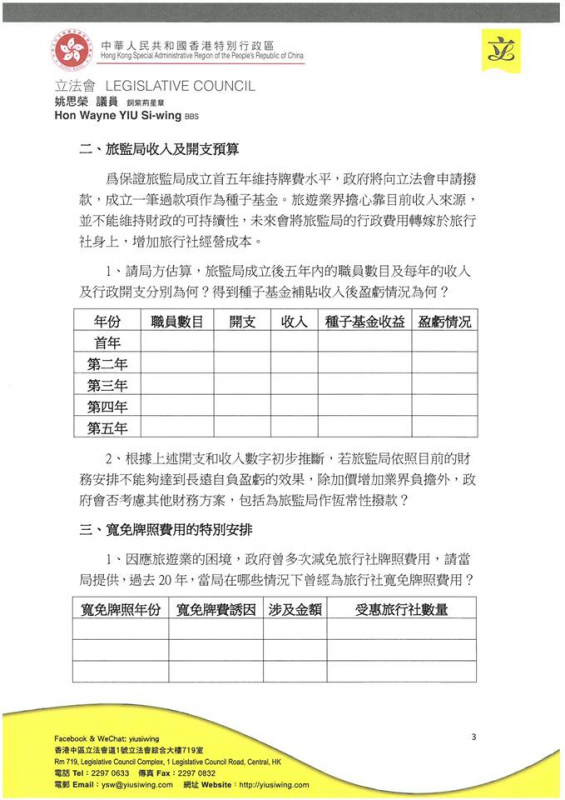
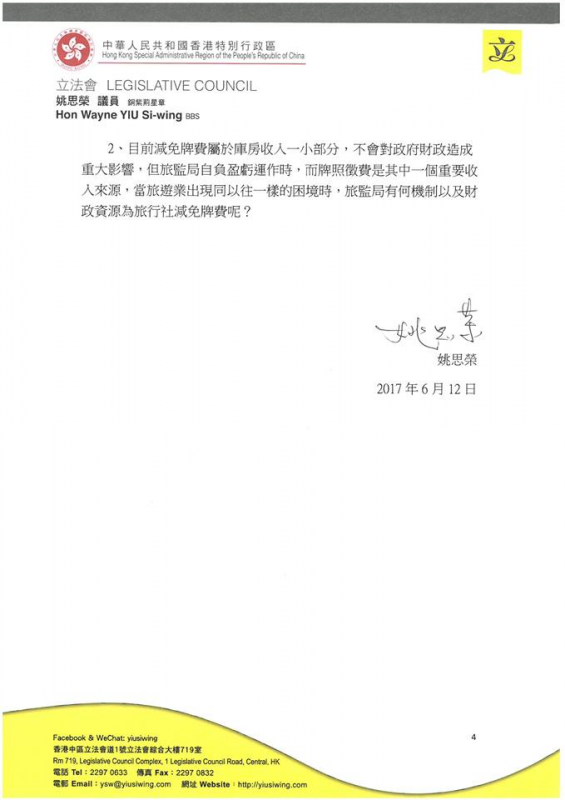
2. Feasibility of waive license fee by TIA in the future
In facing the challenges of online sales and direct sales from product suppliers in recent years, members of the industry have found it difficult to operate their business. In order to ease the burden suffered by members of the industry, the Government has implemented measures to waive their license fees. However, the industry is now concerned that the TIA might increase the license fee by a large scale in response to the profit and loss, which will place the industry in an even more difficult situation. In order to help members of the industry have a clear idea of what they might face in the future, I requested the Governmentto submit the budget for the next five years and compared it with that of the existing TIC during meeting on 6 June, 2017. In addition, I am also concerned about whether there would be a lower chance for waive future license fee under the monitoring of the TIA.
3. Definition of employment relationship between intermediaries and travel agents
Many members of the industry have collaborated with intermediaries in referring tour guides or tour escorts to different travel agents. However, there has never been a clear definition on who is responsible for this kind of employment relationship. To explore more about this issue, I questioned the Government on 10 April, 2017.
4. What is the role of TIA in helping the development of the industry?
On 10 April, 2017, I expressed my concerns on how the TIA can specifically help the tourism industry in the future at the committee meeting of the Bill.
5. To provide a clearer definition of Mainland inbound tourists and prevent members of the industry from unintentionally committing offences
There are currently ambiguities in the Bill on the definition of Mainland inbound tour groups. During the Bills Committee Meeting held on 6 June, 2017, I urged the Government to clarify the original intention of the clause. The Government promised to amend the wordings and improve relevant provisions.
The Bill is now under scrutiny, I will continue to follow up on the concerns raised by members of the industry.